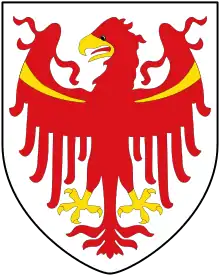Kiens
Kiens (German pronunciation: [ˈkiɛns]; Italian: Chienes [ˈkjɛːnes]) is a comune (municipality) in South Tyrol in northern Italy, located about 50 kilometres (31 mi) northeast of Bolzano.
Kiens | |
|---|---|
| Gemeinde Kiens Comune di Chienes | |
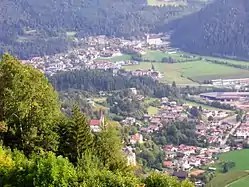 | |
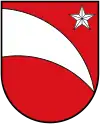 Coat of arms | |
Location of Kiens 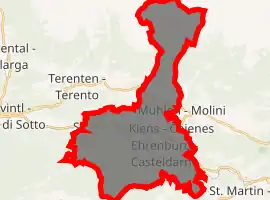
| |
 Kiens Location of Kiens in Italy 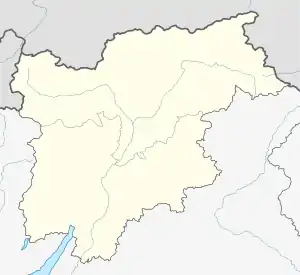 Kiens Kiens (Trentino-Alto Adige/Südtirol) | |
| Coordinates: 46°49′N 11°50′E | |
| Country | Italy |
| Region | Trentino-Alto Adige/Südtirol |
| Province | South Tyrol (BZ) |
| Frazioni | Ehrenburg (Casteldarne), Getzenberg (Monghezzo), Hofern (Corti), St. Sigmund (San Sigismondo) |
| Government | |
| • Mayor | Andreas Falkensteiner |
| Area | |
| • Total | 33.9 km2 (13.1 sq mi) |
| Population (Nov. 2010)[2] | |
| • Total | 2,726 |
| • Density | 80/km2 (210/sq mi) |
| Demonym(s) | German: Kiener Italian: di Chienes |
| Time zone | UTC+1 (CET) |
| • Summer (DST) | UTC+2 (CEST) |
| Postal code | 39030 |
| Dialing code | 0474 |
| Website | Official website |
Geography
As of 30 November 2010, it had a population of 2,726 and an area of 33.9 square kilometres (13.1 sq mi).[3]
Kiens borders the following municipalities: Pfalzen, Rodeneck, St. Lorenzen, Mühlwald, Terenten and Vintl.
Frazioni
The municipality of Kiens contains the frazioni (subdivisions, mainly villages and hamlets) Ehrenburg (Casteldarne), Getzenberg (Monghezzo), Hofern (Corti) and St. Sigmund (San Sigismondo).
History
The hamlet appears for the first time in the Freising book of traditions (Traditionsbuch) in a deed issued in the years 1005—39 as ″locus Kiehna″.[4]
Society
Linguistic distribution
According to the 2011 census, 96.73% of the population speak German, 2.32% Italian and 0.95% Ladin as first language.[6]
Demographic evolution
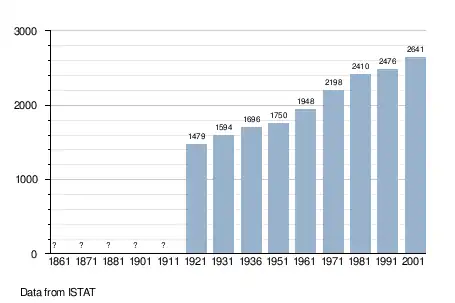
Demographic evolution[7]
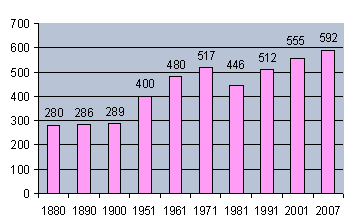
St. Sigmund
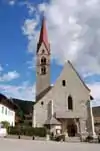
St. Sigmund is a frazione of Kiens, its origins date back to 1050, when first it was called Burin and after Peuren, in 1317.
The town is located where the valley widens into a large flat area, for that reason it enjoys excellent weather conditions throughout the year.
From an architectural point of view, the buildings in the area are based on original South Tyrolean farmsteads style. Especially is notable the parish church (1449–89), where is present the oldest and best preserved altar in Tyrol, dated around 1430. Another point of interest is the Church of Our Lady (German: Stöcklkapelle) dating back to 1621 and built in Baroque style. Behind the railway station, in the river Rienz, there are the Ilistra thermal baths (German: Ilstern), which once featured facilities for cures. Also in this area is the church of St. Ulrich that dates back to 1491 and is well preserved.
References
- "Superficie di Comuni Province e Regioni italiane al 9 ottobre 2011". Istat. Retrieved 16 March 2019.
- "Popolazione Residente al 1° Gennaio 2018". Istat. Retrieved 16 March 2019.
- Overall demographics and other statistics: Italian National Institute of Statistics (ISTAT).
- Martin Bitschnau; Hannes Obermair (2009). Tiroler Urkundenbuch, II. Abteilung: Die Urkunden zur Geschichte des Inn-, Eisack- und Pustertals. Vol. 1: Bis zum Jahr 1140. Innsbruck: Universitätsverlag Wagner. pp. 153, no. 182. ISBN 978-3-7030-0469-8.
- Heraldry of the World: Kiens
- "Volkszählung 2011/Censimento della popolazione 2011". astat info. Provincial Statistics Institute of the Autonomous Province of South Tyrol (38): 6–7. June 2012. Retrieved 2012-06-14.
- Data from the Municipality of Kiens.
External links
- Official website of the municipality (in German and Italian)
- Official website of the frazione of St. Sigmund.
![]() Media related to Kiens at Wikimedia Commons
Media related to Kiens at Wikimedia Commons
